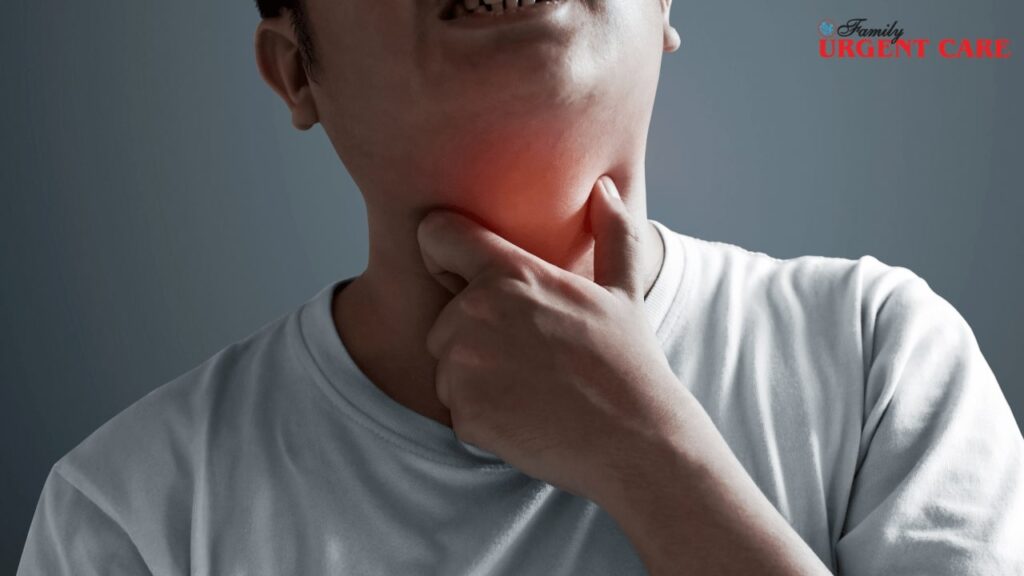Springtime blooms are at their peak, but for many, they come with an everlasting problem—the fear of dreadful allergies.
As the sneezing and watery eyes set in, you might wonder, can these seasonal allergies also cause that pesky sore throat? And if yes, what steps can you take to overcome the symptoms of allergies?
Seasonal or environmental allergies not only does disrupt your daily routine but can also have a negative impact on your personal and work life.
Fear not! In this blog, you’ll explore the link between sore throat and allergies and how you can get rid of the symptoms quickly. Let’s cut to the chase!
Can Pollen Allergies Cause Sore Throat?
Yes, one of the most common pollen allergy symptoms is a scratchy and sore throat. When a person with a seasonal allergy inhales pollen particles or pet dander, the immune system releases a chemical known as histamine.
Histamine initiates an inflammatory response in the body by making the blood vessels leakier, causing white blood cells to move to the site of inflammation. It also causes swelling of the mucus membranes in the nose and triggers excessive mucus release.
When excessive mucus from the nose drips down the throat, a person may feel discomfort and irritation, resulting in a scratchy and sore throat.
How Do I Know If Sore Throat Is Due To An Allergy or Infection?
Most of the time sore throats aren’t due to allergies. There are many different reasons a person might feel throat discomfort. It might be due to a bacterial infection or perhaps a viral flu. Therefore, it is important to consult the healthcare professional to rule out the exact cause of throat pain.
If you inhaled an allergen, you’d probably have several symptoms along with itchy and sore throat. Some of these include:
- Sneezing
- Watery eyes
- Stuffy or runny nose
- Itchiness in mouth and nose
- Hives or rash
On the other hand, a person with bacterial infection experiences tiny red or white spots on the roof of mouth, fever and sore throat with painful swallowing.
If you’re experiencing a persistent sore throat and discomfort, along with other symptoms, you can schedule a visit at Family Urgent Care without any delay. Our dedicated urgent care providers will help you resolve your symptoms after the diagnosis and ensure relief from the nagging symptoms.
Some Natural Home Remedies To Get Rid Of Sore Throat Fast
A sore throat from pollen allergies can be a real drag, especially if it disrupts your normal daily routine. If you’re looking for some remedies that have worked for ages, here are some you can follow:
Saline water gargle: Add half a teaspoon of salt to a glass of water and mix it to make a solution. Gargle at least three to four times a day to soothe the discomfort and itchiness in the throat.
Ginger tea: You can consider sipping ginger tea as it helps relieve inflammation due to persistent coughing or sneezing.
Licorice root: It has antibacterial, anti-inflammatory and antiviral properties that are beneficial in relieving sore throat and IgE-induced allergies.
Place a humidifier: If you have nasal congestion, you may breathe with your mouth. With every breath you take from your mouth, you may be drying your throat, worsening the sore throat. Using a humidifier increases the moisture content in the air and helps reduce irritation.
Increase your fluid intake: The key to relieving sore throat from an allergy is to keep your throat from drying out. So, drink plenty of fluids and avoid sugar beverages, caffeine and alcohol that may cause dehydration.
If you’ve tried all these remedies but still find yourself sneezing with a painful, scratchy throat, visit our clinic for a personalized treatment plan that will actually bring you relief.
How To Get Quick Relief From Sore Throat? A Doctor’s Advice!
The secret to getting rid of a sore throat faster is to manage the underlying cause, which is excessive mucus and cough.
Dr Asrar Sheikh, MD of Family Urgent Care, shares a few ways to calm your sore throat when allergy season is on the rise:
- Avoid allergens at all costs: Whether you’re allergic to pollen or animal dander, try to limit your exposure by keeping your windows closed, cleaning your house often, or changing your HVAC system.
- Over-the-counter medications: If the remedies and precautions aren’t making any difference and your symptoms persist, you can take antihistamines such as loratadine or cetirizine to relieve sneezing, watery eyes and runny or stuffy nose.
- Allergy shots: People who can’t take allergy medications due to complications or when anti-allergy medication can’t do the trick, allergy shots can be the last option for quick relief.
A word of caution!
If your symptoms persist even after trying over-the-counter medications, remedies and taking precautions, seeking a doctor’s advice is crucial to identifying the real problem and treating it accordingly. Read further to find out the signs and symptoms that require a doctor’s advice.
When Can You Visit Urgent Care For Allergies?
- You’re suffering from a stuffy nose, trouble breathing, sore throat, sneezing and watery eyes for the first time and can’t find out any trigger.
- You can’t understand what medications or steps you should take to get quick relief from allergies.
- If you already suffer from asthma along with allergy from any one of these: food, drug, pollen, dust insect or pest.
- You suffer from allergy symptoms several times a year and cannot find out the exact way to get out of it.
- Antihistamines and OTC drugs are not working on your allergy symptoms or they’re causing side effects like nausea, drowsiness etc.
- You have trouble sleeping due to a stuffy nose, sore throat or persistent sneezing.
- You have health problems along with allergies like heart disease, diabetes, and kidney or liver disease.
If you’re experiencing any of the following symptoms mentioned above, our urgent care providers can help make a treatment plan after diagnosing. This will help you know the right medication for your allergy symptoms and how you can avoid serious allergic reactions.
| Note:If you suffer from a severe allergic reaction known as anaphylaxis with symptoms such as hives, swollen face or throat, wheezing, trouble breathing, hoarse voice, severe nasal or chest congestion, vomiting or diarrhea, do not wait and visit an emergency care facility nearby to prevent complications. |
How Long Does A Sore Throat From Allergies Last?
The runtime of your allergy symptoms like scratchy and sore throat, stuffy nose or sneezing depends on your exposure to allergen. For instance, a person with pollen allergy may have a higher chance of an allergic reaction during the pollen season and the symptoms may last between three to six weeks, depending on the exposure. In some people, the symptoms may not be persistent and may come and go on different days.
Takeaway
In a nutshell, the key to getting prompt relief from a sore throat is to take precautionary measures to avoid allergens and try some OTC medications. If your symptoms still persist or they come back again, you need to seek a doctor’s advice to rule out the underlying cause and take steps that can help you defeat allergies.

